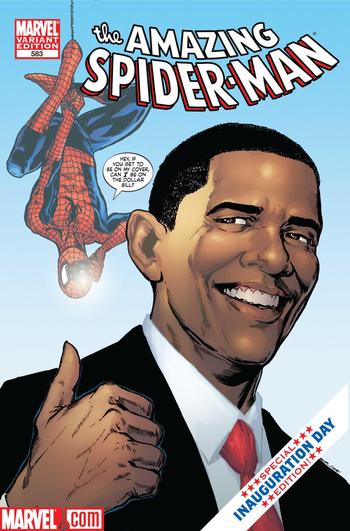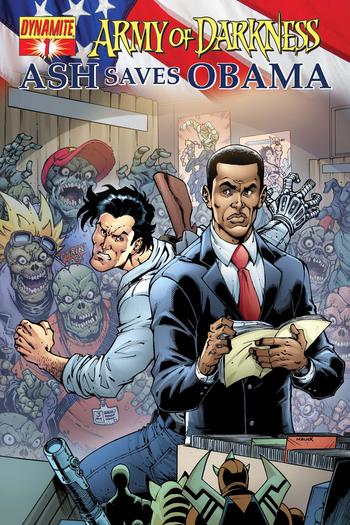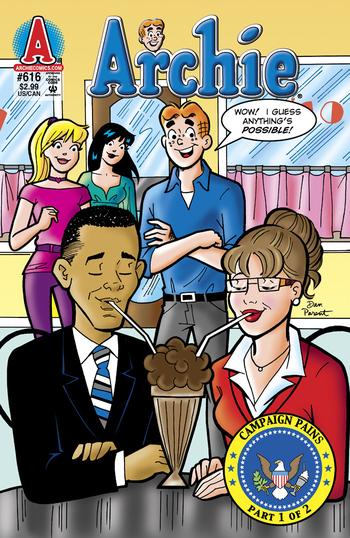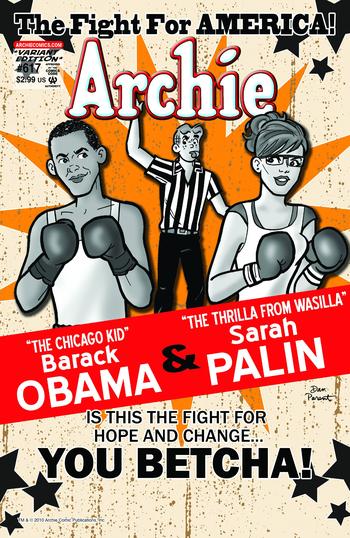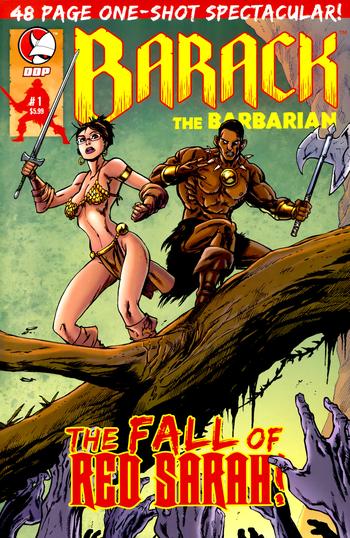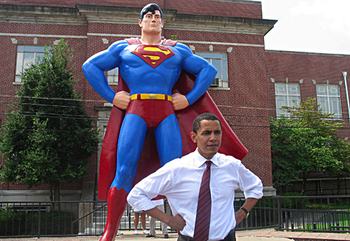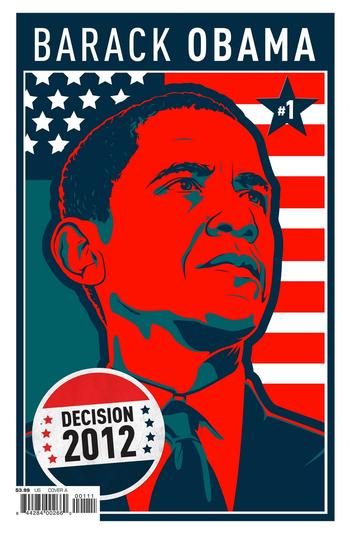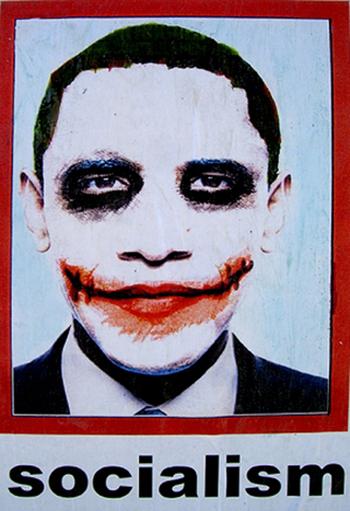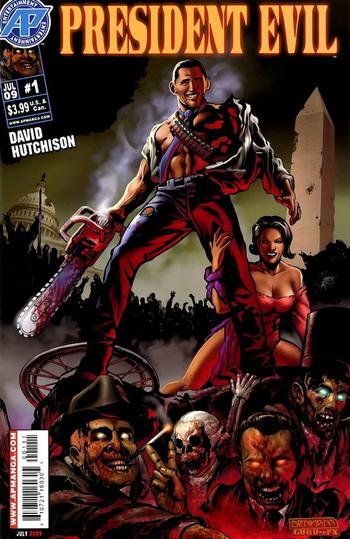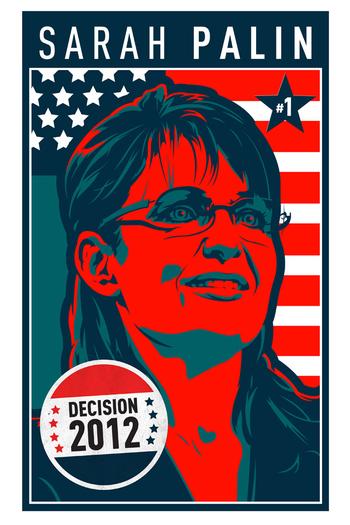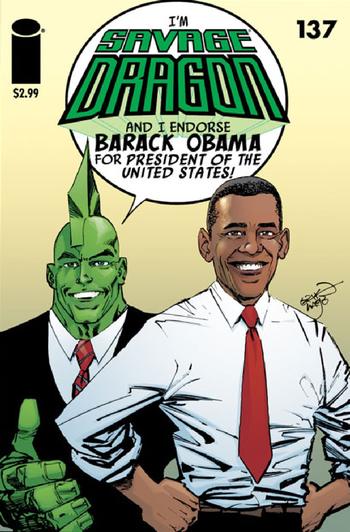Comic book heroes are increasingly wading into the fray of electoral politics. Is the world ready for the era of the Caped Campaigner?
Pop-culture historians of the future may mark September 3, 2008 as the dawn of the comic book era of American politics. That's when Barack Obama, newly minted Democratic nominee for the presidency of the United States, received his most startling celebrity endorsement: A big green thumbs up from fictional fin-headed crimebuster — and fellow Chicagoan — The Savage Dragon.
The Dragon's endorsement, revealed on the cover of the comic's 137th issue, represented the first time a mainstream comic book superhero had ever made a formal declaration of support for a presidential candidate. The character's creator, Image Comics cofounder Erik Larsen, assets that the decision to offer up the nod wasn't made on a whim.
"I'd touched on politics in previous years, but that election in particular seemed more urgent, and more vital, than any in recent memory," says Larsen. "It's dangerous ground to tread to be sure, and some readers made it very clear that they didn't share my political views…there were those who shared their support as well, but overall, it was made pretty clear that readers would prefer I not make this a steady thing."
That apparently didn't stop them from buying the issue: It sold out almost instantly, and ultimately went back for three subsequent reprints — inspiring other comic book publishers to jump on the bandwagon.
To commemorate Obama's inauguration, Marvel Comics unveiled an issue of Amazing Spider-Man featuring a team-up between the web-head and the President, whose admitted status as an avid comics reader and collector made him, in Marvel editor-in-chief Joe Quesada's words, "the first comic book geek president"; the issue sold over half a million copies, making it by far and away the best-selling comic of the decade.
Devil's Due followed that up with Barack the Barbarian, a satirical miniseries penned by veteran G.I. Joe writer Larry Hama, pitting the president in a sword-and-sorcery quest to defeat the dark lord, Cha-nee the Grim, and the bespectacled warrioress Red Sarah. Obama battled zombie hordes in two separate comics titles — Antarctic Press's President Evil, and Dynamite's Army of Darkness: Ash Saves Obama. Even venerable teen-dream Archie got into the act, dragging the President and Sarah Palin into a storyline which saw the redhead from Riverdale running for student president against his arch-nemesis Reggie Mantle.
But the growing convergence of politics and the comics goes far beyond mere Obama tie-ins. Though comics have always had a political aspect — Barack the Barbarian's Hama notes that the comics scene of the '50s and '60s, heavily shaped by Jewish immigrants and underground comics creators, was "overwhelmingly lefty; my mentor, Wally Wood, was proud of having gone to Socialist Party meetings in his youth, if only to meet girls"— the politicization of modern comics is more overt than anything seen in the medium's history.
"Sure, the earliest superheroes promoted FDR's New Deal at home and fought the Nazis abroad," says Marc DiPaolo, author of the new book War, Politics, and Superheroes. "But as society has gotten more activist and debates more strident, superheroes have joined in the argument we see every day on cable news channels, and have started taking sides."
Even the most high-profile titles have become blatantly political, he notes, calling out Marvel's epic "Civil War" crossover event — with its thinly disguised critiques of the PATRIOT Act, Guantanamo Bay and the Tea Party — and a recent Superman story arc, in which the Man of Steel threatens to renounce his American citizenship, as startling and compelling works of direct political commentary.
At the same time, with the partisan establishment ever more obsessed with simple themes, sharp contrasts and vivid "optics," superhero comics have naturally emerged as ideal replacement for the aging pop metaphors of past generations ("Mommy, what's a 'cowboy'?").
In the early months of Obama's bid for the presidency, a casual snapshot of the then-senator posed in front of Metropolis, Ill.'s famous Superman statue were broadcast across the web by supporters seeing it as an emblem of their candidate's determination to fight for core American values; for truth, justice and the American way.
Less than a year later, during Obama's gut-wrenching fight to enact his signature healthcare legislation, a very different image went viral among enraged protesters who saw Obama's policies as a threat to those very same values: A digitally manipulated picture of the president in the ghoulish pancake makeup of Batman's anarchic nemesis The Joker.
For better or for worse, comic books have become an integral part of the American political consciousness — so much so that this year, comic book publisher BOOM! decided to hold the first-ever Comic Book Straw Poll, announcing that it was taking preorders for a slate of comics based on the lives of the President and the contenders for the Republican nomination.
The four comics receiving the most preorders would "win" the straw poll and actually get published. Last week, the winners were announced, with President Obama unsurprisingly reigning triumphant as the fanboy's favorite; Sarah Palin came in second, followed by Ron Paul and Michele Bachmann. Presumptive Republican frontrunner Romney polled in the middle of the pack.
"But the big surprise," notes BOOM! founder Ross Ritchie, "was the fact that former GOP darling Rick Perry came in dead last. Though that's in keeping with trends you're seeing in the general polls, it was still shocking to see how badly he did."
Despite comic-geek-in-chief's win in the Comic Book Straw Poll, don't expect the Dragon to reiterate his historic endorsement. "I don't see repeating it — it was a once in a lifetime kind of thing," says Larsen.
But with Obama vulnerable, and none of the field of Republican hopefuls having yet distinguished themselves as ready to break away from the pack, a vote of confidence from a costumed crimefighter might be just what the candidate ordered. We asked comic book politics historian Marc DiPaolo — whose book opens with a chapter asking, "Are Superheroes Republican?" — for his take on who the major icons of the comic-book universe might choose in the race for 2012:

Superman
Political Orientation: New Deal Democrat in his youth; now a Joe Lieberman moderate with strong interventionalist tendencies
Key Issues: Homeland security; an aggressively pro-democratic foreign policy; human rights. As an illegal alien — literally — who benefited from amnesty, likely to be strongly in favor of immigration reform.
Would Likely Support: Obama — but would probably withhold endorsement and work closely with whomever gets elected. Also, alter-ego Clark Kent is a journalist and might not be able to take a publicly partisan stance.
DiPaolo's Take: "Today, we see Superman as the avatar of small-town, middle-class Middle America, but the truth is his history is entirely inconsistent — he has political leanings that are so wildly different that they almost can't be reconciled. In the '40s, he was a hard-core anti-corporatist, workers' rights advocate kind of guy. The third issue of Action Comics has him saving a miner from a cave-in, and then, once he hears about the unsafe working conditions, trapping the mine's rich owner and his black-tie party-guests underground until the owner agrees to upgrade his company's safety standards. But by the '80s, John Byrne was having him report to Reagan. In the latest reboot, we may be seeing that radical Superman of the Great Depression come back, though: The first issue of the new Action Comics has him throwing this uber-industrialist media mogul off a roof."

Batman
Political Orientation: Rockefeller Republican with strong emphasis on law-and-order in his youth; has become more of a "ends justify the means" neo-libertarian over time.
Key Issues: Law and order, law and order, law and order. Probably anti-tax (inherited much of his wealth; hides a massive amount of Bat-spending behind a series of Alfred-managed shell corporations). Pro gay rights?
Would Likely Support: As Batman, nobody, though possibly a secret Ron Paul sympathizer. Cynical of government's ability to get things done. His alter ego, playboy industrialist Bruce Wayne, is a political dilettante, favoring causes rather than candidates.
DiPaolo's Take: "Batman was created as a riff on classic German silent suspense films, merged with aspects of Victorian Gothic literature — Dr. Mabuse meets Mr. Rochester meets Sherlock Holmes. And all of that stuff is violent and irrational; really subversive yet really authoritarian at the same time. Well, that's Batman. He's got a castle, he's really rich, he beats the crap out of people. You'd think he'd be really conservative. And yet obviously has these strong liberal tendencies as well: He's always giving money to inner-city youth programs and save-the-rainforest charities. Of course, you could argue that those are consistent with conservative politics — he doesn't believe that government can fix things, he believes in private industry and individual philanthropy. He's also been co-opted as a closeted gay character, which you could argue might be consistent with conservative politics as well."
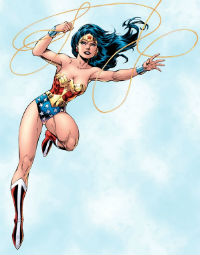
Wonder Woman
Political Orientation: Though she is herself royalty (the daughter of the benevolent absolute ruler of a tiny, isolated island nation), she has always been depicted as strongly progressive — the ultimate feminist, pacifist icon.
Key Issues: Gender rights, the end of war, social justice, economic equality.
Would Likely Support: Obama, with great reluctance; would have favored Hillary. Secretly rooting for Elizabeth Warren in 2016.
DiPaolo's Take: "Wonder Woman would absolutely have supported Hillary Clinton over Obama in 2008, and probably still thinks Hillary should have primaried Obama for 2012. Her reservations would have been Hillary's hawkish tendencies and her vote on the Iraq War. I think Diana would be annoyed that there isn't a true progressive running, like a Dennis Kucinich. And yes, she'd be a huge Elizabeth Warren fan. Oh my God, yes."
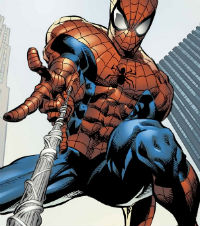
Spider-Man
Political Orientation: Creator Steve Ditko, a huge fan of Ayn Rand, saw Spider-Man as a vehicle to express Objectivist ideals; his editor, Stan Lee, disagreed, making Spidey more underdog than ubermensch. Since then, the webhead has been the epitome of the confused, ambivalent youth voter.
Key Issues: Investment in basic research; STEM education; healthcare reform (Peter Parker hasn't held down a job with benefits in, like, forever)
Would Likely Support: Obama. Hey, the two are buds.
DiPaolo's Take: "The original Ditko Spider-Man would have been out there volunteering for Ron Paul. Today's Spider-Man would be out there participating in the Occupy Wall Street movement."
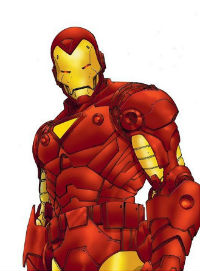
Iron Man
Political Orientation: Pro-business Republican with neo-conservative foreign policy leanings.
Key Issues: Homeland security; deregulation and improving the climate for innovation; free trade; corporate taxes; concern over the rise of China (which probably has something to do with The Mandarin)
Would Likely Support: Initial flirtation with Rick Perry, but probably Mitt Romney by now.
DiPaolo's Take: "Iron Man has been depicted as a neoconservative for years now. He was a Bush stand-in during Marvel's Civil War saga, so I suspect he'd have been tempted to support Rick Perry, who seems the most like a George Bush III figure.
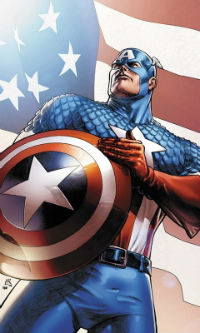
Captain America
Political Orientation: Old-school Kennedy Liberal, according to JFK's own definition: "If by 'Liberal' they mean…someone who is soft in his policies abroad, who is against local government, and who is unconcerned with the taxpayer's dollar, then the record of this party and its members demonstrate that we are not that kind of 'Liberal.' But if by a 'Liberal' they mean someone who looks ahead and not behind, someone who welcomes new ideas without rigid reactions, someone who cares about the welfare of the people — their health, their housing, their schools, their jobs, their civil rights, and their civil liberties — someone who believes we can break through the stalemate and suspicions that grip us in our policies abroad, if that is what they mean by a 'Liberal,' then I'm proud to say I'm a Liberal."
Key Issues: Civil liberties; veterans issues; poverty; race relations
Would Likely Support: Would be a strong public Obama supporter, though he'd privately be expressing concerns over the president's unwillingness to take stronger stances — probably to the president himself, in the Oval Office
DiPaolo's Take: "There's no question that Cap would be supporting Obama for reelection — and pushing him to be better at preventing the Republicans from making cuts to social programs in his next term."
Jeff Yang, Pop & Politics blogger for "It's a Free Country," writes the column Tao Jones for the Wall Street Journal Online. Follow him on Twitter at @originalspin.
